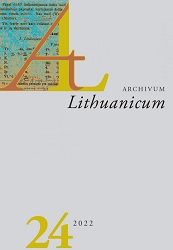Lietuvių kalba kaip kalbos politikos objektas Prūsijos Karalystėje: XVIII a. pradžios diskursas
The Lithuanian Language as an Object of the Policy on Languge in the Kingdom of Prussia: The Discourse of the Early 18th Century
Author(s): Ona AleknavičienėSubject(s): Governance, Political history, Baltic Languages, 18th Century, Philology
Published by: Lietuvių Kalbos Institutas
Keywords: Lithuanian language; language policy; Kingdom of Prussia; early 18th century; philological problems;
Summary/Abstract: The article deals with the philological polemics that took place in the Kingdom of Prussia in the 1710s as the first discourse recorded in writing that addressed matters of using the Lithuanian language in social life, covering, among other things, aspects of the policy on language and language planning. Since the process concerning the public language had the involvement of governmental officials who acted in the name of the Prussian Church and the King, and had the authority to adopt different decisions, the Lithuanian language became an object of policy on language in a specific sense. The first language policy makers who in the 18th century recognised and advocated the problems of the quality of the public Lithuanian language and took to making decisions to have the public involved in the resolution of the language matters were as follows: (1) Friedrich Deutsch (1657–1709), comptroller of Prussian churches and schools, chief preacher of the palace, and theology professor at Königsberg University; (2) Johann Berent (1658–1712), councillor of the court of the palace of Königsberg and former law professor at Königsberg University; (3) George Friedrich von Kreitzen (1639–1710), chancellor of the Kingdom of Prussia as a member of the government. Mörlin was the first to identify the issues with using the Lithuanian language in social life, and suggested making an impact on the written and spoken language, especially the language that was used by higher-ranking individuals. By publicising his principles, initiating a demonstration of how they could be applied in practice, and engaging the educated part of the public in the discussion, he sought to give some social and cultural power to his principles. Mörlin’s Principium Primarium in Lingva Lithvanica was the first tract on Lithuanian linguistics to promote a number of ideas regarding the more functional use of the Lithuanian language in social life. Based on the spoken language of the people and on folklore, it proposed that the spoken and written language used by priests should be regulated so that it catered to the needs of the majority of the public. With their activities aimed at having an impact on the language of the upper social classes, the participants in the discourse who supported Mörlin and his ideas sought to close the gap between the different language variations and to make communication easier. Mörlin considered having an impact on the spoken and written Lithuanian language that the upper social classes used to be one of the ways to resolve social and cultural problems, which could facilitate the spread of Christianity and the education of the lower classes. As the need to regulate the Lithuanian language also had the support of Prussian ecclesiastical and governmental bodies that envisioned ways to continue and manage processes that were already under way, the discourse of the policy on language in the early 18th century should be considered as the first to demonstrate the aim of both individuals and the state to influence the language and its user groups in a bid for better communication as a stepping stone towards the consolidation of the Prussian Church’s positions and the advancement of society as such.
Journal: Archivum Lithuanicum
- Issue Year: 2022
- Issue No: 24
- Page Range: 57-102
- Page Count: 46
- Language: Lithuanian

